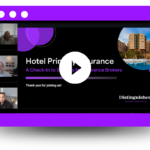Risk Management: The Key to Mitigating Sex Trafficking at Hotels
A lawsuit filed in U.S. federal court in Ohio in December against a number of high-profile hotel groups alleging they profited from sex trafficking on their properties puts the focus on this hidden crime. The hotel chains, according to Reuters, are accused of “knowing and ignoring warning signs that women and children were sold as sex slaves on their premises.”
“Such corporate malfeasance has led to a burgeoning of sex trafficking occurring in … hotels that has reached the level of a nationwide epidemic,” the lawsuit stated.
According to the National Human Trafficking Hotline, hotels and motels are a common venue for sex trafficking, due to ease of access for buyers, ability to pay in cash and maintain secrecy through finances, and lack of facility maintenance or upkeep expenses. Indeed, anti-trafficking advocacy organization Polaris recorded more than 3,500 cases of trafficking in hotels and motels alone over a ten-year period (2007-2017).
It’s important to note that U.S. law creates corporate liability for entities such as hotels, casinos and restaurants that benefit from human trafficking if they know or “should have known” about such exploitation. This makes anti-human trafficking compliance paramount to avoid potential liability based on employees’ knowledge of trafficking occurring in connection with a company’s business.
Preventing Trafficking in the Hospitality Industry
There are steps hotel chains can take to tackle sex trafficking on their properties. The first step involves understanding the type of acts that fall under human or sex trafficking. According to the United Nations Protocol to Prevent, Suppress and Punish Trafficking in Persons, human trafficking is defined as the:
Recruitment, transportation, transfer, harboring or receipt of persons, by means of threat or use of force or other forms of coercion, of abduction, of fraud, of deception, of the abuse of power or of a position of vulnerability or of the giving or receiving of payments or benefits, to achieve the consent of a person having control over another person, for the purpose of exploitation. Exploitation shall include, at a minimum, the exploitation of the prostitution of others or other forms of sexual exploitation, forced labor or services, slavery or practices similar to slavery, servitude or the removal of organs.
Additional Steps to Prevent Sex Trafficking
Other steps hotels should be taking to thwart trafficking on their properties include:
- Adopting a company-wide anti-trafficking policy that clearly articulates the company’s commitment to combating all forms of human trafficking. Clearly communicate and implement the policy at all levels to ensure there is no human trafficking on-site, within the workforce, and within the company’s sourcing and procurement supply chains.
- Conducting proactive training to help employees identify signals of prostitution and possible signals of human trafficking. Hotel and motel staff includes housekeeping, maintenance, and room service staff; concierge, bellman, front desk, security, and valet staff; and food and beverage. Possible warning signs, according to Risk Management Magazine, include: nervous behavior, having large amounts of cash, tipping front desk staffers, guests asking for rooms far from the front desk, excessive phone calls to and from the room, excessive tablets or cell phones in the room, and multiple male guests going to one room. Additional signs of potential trafficking that the staff should look for can be found here.
Cities and states in fact are addressing the issue of trafficking and hotel training. For example, in California, a new law requires hotels and motels subject to the Fair Employment and Housing Act to provide at least 20 minutes of classroom or other interactive human trafficking awareness training and education to each employee who is likely to interact or come into contact with victims of human trafficking.
Mandatory Human Trafficking Prevention Training
In fact, as of January 1, 2020, employers must provide such training once every two years to employees who have reoccurring interactions with the public, including, but not limited to, those who work in a reception area, perform housekeeping duties, help customers in moving their possessions or drive customers. The mandatory training must include:
- The definition of human trafficking and
commercial exploitation of children;
- Guidance on how to identify individuals most at risk for human trafficking;
- The difference between labor and sex trafficking as it applies to the hotel sector
- Guidance on the role of hospitality employees in reporting and responding to this issue; and
- Contact information of appropriate agencies.
- Ensuring the hotel’s employee manual addresses housekeeping, security, surveillance cameras, suspicious behavior, human trafficking, guest interactions, reservation procedures, photo identification requirements, age requirements for renting rooms, policies about alcohol on the premises and parties in the room and/or conference rooms, and the number of guests and friends allowed in a room.
- Having hotel staff monitor trafficking claims at nearby establishments or similar hotels, and also being aware of seasonal traffic, construction jobs in the area, and extended stays that are booked from day to day.
- Performing an internal review of the hotel’s existing policies and procedures to identify areas that may be subject to exploitation by traffickers (and making needed corrections).
- Assessing the hotel’s prospective suppliers’ and contractors’ labor practices.
- Establishing a response plan involving a safe-reporting mechanism so that the hotel has clear procedures for responding to and/or reporting suspected human trafficking.
There are many other steps hotels should be implementing to help combat human trafficking while also protecting their operations and reputations. In addition to having robust risk management measures in place, make sure a hotel has secured sufficient amounts of Liability insurance including an Umbrella policy. Distinguished Programs provides the hospitality industry with Umbrella limits up to $250 million. You can learn more about our insurance program here.
Sources: Reuters, National Human Trafficking Hotline, Polaris, Risk Management Magazine, Pillsbury Insights, Department of Homeland Security




